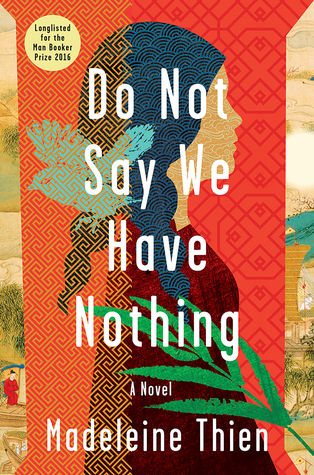Our book choice for September 2019 is Do Not Say We Have Nothing by Madeleine Thien. Master storyteller Madeleine Thien takes us inside an extended family in China, showing us the lives of two successive generations—those who lived through Mao’s Cultural Revolution and their children, who became the students protesting in Tiananmen Square.
The novel Do Not Say We Have Nothing by Madeleine Thien is a sweeping historical epic that tells the story of three generations of Chinese families through the lens of music and art. The story begins in 1991, when 10-year-old Marie (Li-ling) lives with her mother in Vancouver, Canada. Marie’s father, Jiang Kai, committed suicide in Hong Kong a few years earlier, and she is still struggling to come to terms with his death.
One day, Marie’s mother receives a letter from Ling, a family friend from China. Ling’s daughter, Ai-Ming, has been forced to flee China after participating in the Tiananmen Square protests. Marie’s mother agrees to let Ai-Ming stay with them, and the two girls quickly become close.
Ai-Ming tells Marie about her family’s history. Her father, Sparrow, was a gifted composer who studied at the Shanghai Conservatory of Music. He was also a friend of Jiang Kai’s, and the two men shared a love of music. Sparrow was killed during the Tiananmen Square protests, and Ai-Ming is now the only surviving member of her family.
As Marie and Ai-Ming grow closer, they begin to explore their family’s history through the music and art that they have inherited. They discover a book of stories called The Book of Records, which has been passed down through their families for generations. The book tells the story of two sisters, Big Mother Knife and Swirl, who make their living by singing and performing in different towns across China during the Chinese Civil War.
The Book of Records is a captivating novel about love, loss, and the power of music. As Marie and Ai-Ming read the book, they begin to understand the depths of their family’s pain and loss. They also begin to see how music can be a powerful force for healing and connection.
The novel Do Not Say We Have Nothing is a moving and powerful story about the power of art and music to transcend the pain of history. It is a story about family, loss, and the search for meaning in a world that is often full of violence and oppression.
In addition to the main story, the novel also tells the stories of several other characters, including Big Mother Knife, Swirl, Wen the Dreamer, and the Old Cat. These characters help to flesh out the novel’s setting and provide a more nuanced understanding of the historical events that are depicted.
The novel is also notable for its beautiful prose. Thien’s writing is lyrical and evocative, and she does a masterful job of capturing the beauty and complexity of the Chinese language.
Do Not Say We Have Nothing is a powerful and moving novel that will stay with you long after you finish reading it. It is a story about the power of art and music to transcend the pain of history.
Discussion Questions for Do Not Say We Have Nothing
- How did you feel reading the book?
- In the book time folds in on itself, what did you think about the structure?
- Why does Sparrow burn his work?
- Was kai Jang ever able to be himself?
- We meet Zhuli, Aming and Liling/Marie all at the same point in their lives, facing different circumstances. Are they similar, and do they face similar challenges?
- There are many colourful secondary characters, which is your favourite and why?
- Which theme of the book resonated with you?
- The book of records represents history, passed on and changing – what is the author saying about history in this book?
- What do you think is the significance of the title

